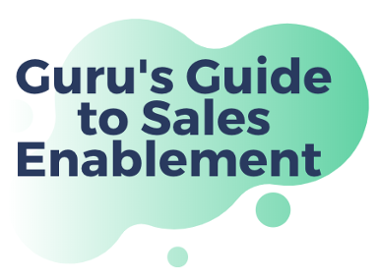The Engine Behind Sales Acceleration: Sales Enablement
営業加速をUnlock する鍵は、主題専門家と知識消費者の両方に対応する適切な営業支援機能です。
B2B SaaS 業界のすべてのチームが知っておくべき用語は、営業支援と営業加速の2つです。
注: 私が言ったのはすべてのチームです...営業支援と営業加速は、本当にあなたの主題専門家(マーケティング、製品など)と情報を求める知識消費者(営業、顧客成功、サポートチームなどの顧客接点チーム)が簡単にコラボレーションし、情報を共有できるときにのみ成功します。 チーム間のコラボレーションがなければ、営業担当者は十分な知識や、取引を締結するために必要な最も正確な情報を持っていません。 ご想像の通り、それはビジネスが損失を被ることを意味します。
これらの用語を調べると、B2B営業業界のいくつかのリーダーが提供する多くの定義が見つかります。
例えば、TOPO Groupという営業アナリスト会社が提供した営業支援の定義は次の通りです。
「営業支援は、一次的なトレーニングイベントではなく、スケーラブルで再現可能なプログラムを構築し、必要な情報を適切な営業担当者に適切なタイミングで提供することに焦点を当てています。」
そして営業加速を定義する際に、Forbesはこのシンプルな説明を提供しました。
「営業加速とは、営業プロセスの速度を上げることを意味します。」
ご覧の通り、円滑に機能する支援プロセスがなければ、いかなる加速も達成するのは難しいです。 そして、適切なツールがないと、これらのいずれかをマスターするのが混乱します。
情報過多は営業チームにとって現実の問題であり、取引を失う原因となっています。
情報を整理し最新の状態に保つための戦略的計画がない場合、知識を提供することは無意味で時間を無駄にします。 一分間、あなたの営業担当者の立場になって考えてみてください。 顧客があなたに答えを見つける必要がある質問をする状況を想像してみてください。
専任の営業支援チームやソリューションがなければ、必要な情報を見つけるために、知識が保存されている複数のリポジトリ(Google ドキュメント、Box、チャット、メールスレッドなど)を検索することになるでしょう。 たとえ見つけても、それがまだ正確かどうかわからないでしょう。
適切な情報を常に手元に持って営業担当者を支援すると、営業担当者が直接制御できる要因に基づいて取引を失う可能性が低くなります。 取引を失うことは決して楽しくありませんが、営業担当者が正確な知識を見つけることができないために失うことは、時間が経つにつれて営業加速の取り組みを crippling させる可能性があります。
営業支援を成長段階におけるあなたのビジネスのための裏方作業を行う大工のように考えています。 営業担当者があなたの製品を販売している間、彼らはより多くの取引を締結するために必要なすべての情報にアクセスできるシステムを構築しています。 彼らがいないと、システムは破損します。
チームの主題専門家からの知識が非効率的に一度きりの会話で提供され、営業の知識が漏れてしまう原因になります。 あなたの担当者の一人か二人が、あなたの専門家にダイレクトメッセージを送信する際に情報を得るかもしれませんが、知識は効率的にキャプチャされず、あなたの全チームに流れていません。 あなたのチームに営業支援の担当者がいて、適切な営業支援ソリューションを導入すると、システムは完全に機能し、漏れもありません。 知識は、適切な場所で、適切な人に、適切なタイミングでルーティングされます。 今、それは美しい光景です。
したがって、営業支援や営業加速を本気で考えている場合、ひとりの人やチームだけに集中しないでください。
代わりに、あなたの組織内で営業知識を作成し、消費する際には、これらの二つの人々のグループに焦点を当ててください。
営業支援に関するさらなる情報をお探しですか? Guruの新しいガイドをご覧ください:
あなたの知識消費者と知識提供者を理解することが営業を加速させる鍵です。
きちんと機能する営業支援の仕組みは、知識提供者と知識消費者の両方のタスクを同時に理解することが必要です。
あなたの知識提供者は、製品マネージャー、営業VP、製品マーケティング、営業運営などの役職を持つ場合があります。 彼らは、あなたの顧客と接するチームが見込み客や顧客と話すときに活用する知識を作成する人です。
あなたの知識消費者は主に顧客と接するチームであり、営業開発担当者、アカウントエグゼクティブ、サポートエージェント、顧客成功担当者などの役職を持つ場合があります。
さて、これらの各ペルソナが営業支援の文脈において何を重視しているのか、もう少し深く見ていきましょう。
知識提供者が重視すること
1. 気を散らす肩タップや一度きりのメッセージを止める
あなたの主題専門家は、仕事から気を散らせる肩タップや一度きりのメッセージを排除できればあなたを信じてくれるでしょう。 そして、専門家を気を散らせることは、あなたの会社に実際のお金を費やしています。最近の研究は、気の散る要素から回復するのに平均して23分15秒かかると示しています!
2. コンテンツを最新の状態に保つ:あなたがそれを思い出す必要がないように
先ほど述べたように、知識の作成は簡単です。 しかし、そのコンテンツを更新することはそれほど簡単ではありません。 時折、あなたの専門家に情報を更新するようにプロアクティブにリマインドまたはプッシュする方法があれば素晴らしいと思いませんか?
知識消費者が重視すること
1. 作業フローでコンテンツを消費する、別の場所を開かない
これは、知識消費者が気を散らす肩タップや一度きりのメッセージを嫌うことに相当します。 あなたの知識消費者は、仕事を最も効果的かつ効率的に行うために、整ったワークフローに強く依存しています。 彼らにとって最もイライラするのは、通常の作業フローの外で何かをしなければならないことです。 したがって、営業支援の役割は、彼らが仕事をする場所、たとえば受信トレイ、CRM、サポートチケッティングシステムなどで、彼らが必要な知識やコンテンツを提供することです。
2. 短く、簡単に消費できるコンテンツ
営業支援チームの重要なマインドセットは、営業担当者があらゆる販売状況で作成したコンテンツをどのように消費するかに共感できることです。 短く、容易に消化可能なコンテンツは、15ページの文書の中から特定の情報を見つけるよりも、電話で参照する方がはるかに簡単です。
3. そのコンテンツがまだ正確であるという信頼
あなたの知識提供者が肩タップや一度きりのメッセージを受け取る原因のもう一つの重要な理由は、あなたの営業担当者があなたの知識リポジトリのコンテンツがまだ正確だと信じていないからです。 ビジネスの急速な変化により、あなたの営業担当者は、最新かつ最高のコンテンツを使用していることを確認するために、専門家の承認のスタンプが必要です。 その信頼があれば、専門家への肩タップや一度きりのメッセージが減ります。 それはウィンウィンです。
適切な営業支援チームと戦略がなければ、営業の加速は難しいです。 しかし、営業支援チームがこれらの二つのペルソナを念頭に置いていれば、達成するのはずっと簡単になります。
B2B SaaS 業界のすべてのチームが知っておくべき用語は、営業支援と営業加速の2つです。
注: 私が言ったのはすべてのチームです...営業支援と営業加速は、本当にあなたの主題専門家(マーケティング、製品など)と情報を求める知識消費者(営業、顧客成功、サポートチームなどの顧客接点チーム)が簡単にコラボレーションし、情報を共有できるときにのみ成功します。 チーム間のコラボレーションがなければ、営業担当者は十分な知識や、取引を締結するために必要な最も正確な情報を持っていません。 ご想像の通り、それはビジネスが損失を被ることを意味します。
これらの用語を調べると、B2B営業業界のいくつかのリーダーが提供する多くの定義が見つかります。
例えば、TOPO Groupという営業アナリスト会社が提供した営業支援の定義は次の通りです。
「営業支援は、一次的なトレーニングイベントではなく、スケーラブルで再現可能なプログラムを構築し、必要な情報を適切な営業担当者に適切なタイミングで提供することに焦点を当てています。」
そして営業加速を定義する際に、Forbesはこのシンプルな説明を提供しました。
「営業加速とは、営業プロセスの速度を上げることを意味します。」
ご覧の通り、円滑に機能する支援プロセスがなければ、いかなる加速も達成するのは難しいです。 そして、適切なツールがないと、これらのいずれかをマスターするのが混乱します。
情報過多は営業チームにとって現実の問題であり、取引を失う原因となっています。
情報を整理し最新の状態に保つための戦略的計画がない場合、知識を提供することは無意味で時間を無駄にします。 一分間、あなたの営業担当者の立場になって考えてみてください。 顧客があなたに答えを見つける必要がある質問をする状況を想像してみてください。
専任の営業支援チームやソリューションがなければ、必要な情報を見つけるために、知識が保存されている複数のリポジトリ(Google ドキュメント、Box、チャット、メールスレッドなど)を検索することになるでしょう。 たとえ見つけても、それがまだ正確かどうかわからないでしょう。
適切な情報を常に手元に持って営業担当者を支援すると、営業担当者が直接制御できる要因に基づいて取引を失う可能性が低くなります。 取引を失うことは決して楽しくありませんが、営業担当者が正確な知識を見つけることができないために失うことは、時間が経つにつれて営業加速の取り組みを crippling させる可能性があります。
営業支援を成長段階におけるあなたのビジネスのための裏方作業を行う大工のように考えています。 営業担当者があなたの製品を販売している間、彼らはより多くの取引を締結するために必要なすべての情報にアクセスできるシステムを構築しています。 彼らがいないと、システムは破損します。
チームの主題専門家からの知識が非効率的に一度きりの会話で提供され、営業の知識が漏れてしまう原因になります。 あなたの担当者の一人か二人が、あなたの専門家にダイレクトメッセージを送信する際に情報を得るかもしれませんが、知識は効率的にキャプチャされず、あなたの全チームに流れていません。 あなたのチームに営業支援の担当者がいて、適切な営業支援ソリューションを導入すると、システムは完全に機能し、漏れもありません。 知識は、適切な場所で、適切な人に、適切なタイミングでルーティングされます。 今、それは美しい光景です。
したがって、営業支援や営業加速を本気で考えている場合、ひとりの人やチームだけに集中しないでください。
代わりに、あなたの組織内で営業知識を作成し、消費する際には、これらの二つの人々のグループに焦点を当ててください。
営業支援に関するさらなる情報をお探しですか? Guruの新しいガイドをご覧ください:
あなたの知識消費者と知識提供者を理解することが営業を加速させる鍵です。
きちんと機能する営業支援の仕組みは、知識提供者と知識消費者の両方のタスクを同時に理解することが必要です。
あなたの知識提供者は、製品マネージャー、営業VP、製品マーケティング、営業運営などの役職を持つ場合があります。 彼らは、あなたの顧客と接するチームが見込み客や顧客と話すときに活用する知識を作成する人です。
あなたの知識消費者は主に顧客と接するチームであり、営業開発担当者、アカウントエグゼクティブ、サポートエージェント、顧客成功担当者などの役職を持つ場合があります。
さて、これらの各ペルソナが営業支援の文脈において何を重視しているのか、もう少し深く見ていきましょう。
知識提供者が重視すること
1. 気を散らす肩タップや一度きりのメッセージを止める
あなたの主題専門家は、仕事から気を散らせる肩タップや一度きりのメッセージを排除できればあなたを信じてくれるでしょう。 そして、専門家を気を散らせることは、あなたの会社に実際のお金を費やしています。最近の研究は、気の散る要素から回復するのに平均して23分15秒かかると示しています!
2. コンテンツを最新の状態に保つ:あなたがそれを思い出す必要がないように
先ほど述べたように、知識の作成は簡単です。 しかし、そのコンテンツを更新することはそれほど簡単ではありません。 時折、あなたの専門家に情報を更新するようにプロアクティブにリマインドまたはプッシュする方法があれば素晴らしいと思いませんか?
知識消費者が重視すること
1. 作業フローでコンテンツを消費する、別の場所を開かない
これは、知識消費者が気を散らす肩タップや一度きりのメッセージを嫌うことに相当します。 あなたの知識消費者は、仕事を最も効果的かつ効率的に行うために、整ったワークフローに強く依存しています。 彼らにとって最もイライラするのは、通常の作業フローの外で何かをしなければならないことです。 したがって、営業支援の役割は、彼らが仕事をする場所、たとえば受信トレイ、CRM、サポートチケッティングシステムなどで、彼らが必要な知識やコンテンツを提供することです。
2. 短く、簡単に消費できるコンテンツ
営業支援チームの重要なマインドセットは、営業担当者があらゆる販売状況で作成したコンテンツをどのように消費するかに共感できることです。 短く、容易に消化可能なコンテンツは、15ページの文書の中から特定の情報を見つけるよりも、電話で参照する方がはるかに簡単です。
3. そのコンテンツがまだ正確であるという信頼
あなたの知識提供者が肩タップや一度きりのメッセージを受け取る原因のもう一つの重要な理由は、あなたの営業担当者があなたの知識リポジトリのコンテンツがまだ正確だと信じていないからです。 ビジネスの急速な変化により、あなたの営業担当者は、最新かつ最高のコンテンツを使用していることを確認するために、専門家の承認のスタンプが必要です。 その信頼があれば、専門家への肩タップや一度きりのメッセージが減ります。 それはウィンウィンです。
適切な営業支援チームと戦略がなければ、営業の加速は難しいです。 しかし、営業支援チームがこれらの二つのペルソナを念頭に置いていれば、達成するのはずっと簡単になります。
Experience the power of the Guru platform firsthand – take our interactive product tour
見学する






